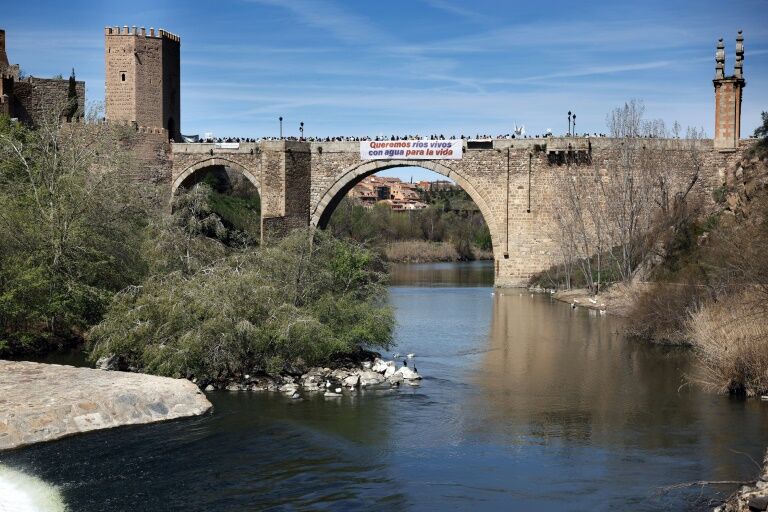Spanish agriculture’s future threatened by potential water cuts

Spanish farmers, like Juan Francisco Abellaneda, provide European supermarkets with fresh fruits and vegetables throughout the year. However, these intensive farms in arid Southeastern Spain may soon face a water crisis, threatening the sector that supplies essential produce across the continent.
Spain tops the European Union list in fruit and vegetable production. Almost half of these exports come from farmers who rely on the water transferred from the River Tagus, stretching hundreds of kilometres to the North. But with climate change intensifying its impact on Spain, and nearly 75% of the country on the verge of desertification, the Spanish government is poised to limit the flow of water from the Tagus to the southeastern Levante region.
The Iberian Peninsula’s longest river, the Tagus, has experienced a significant decline in water levels. In some areas, people are even able to cross its dried-up bed on foot during summer. Similar to the shrinking Nile in Egypt and the Tigris in Iraq, the water rights of the Tagus have become a politically sensitive issue, especially ahead of the regional elections. The intensive agriculture industry, a pillar of the Spanish economy, has come under scrutiny, reports Bangkok Post.
Domingo Baeza, a professor of river ecology at the Autonomous University of Madrid, stated that the region is one of Spain’s driest, without adequate water resources to sustain its intensive agriculture. As a solution, the Tagus-Segura Water Transfer project was established in 1960 under General Franco. The project comprises 300km of canals, tunnels, aqueducts, and reservoirs, transferring billions of litres of water from the Tagus to the Segura basin, located between Murcia and Andalusia. Once known as a model for managing droughts, it is now accused of exacerbating them.
Meanwhile, the Levante region, comprising the parched provinces of Murcia, Alicante, and Almeria, has emerged as Europe’s largest horticultural hotspot, employing 100,000 people and generating an annual revenue of 3 billion euros (around US$ 3.3billion).
However, as Baeza pointed out, the Tagus is struggling, with numerous areas showing degradation due to its overuse in irrigating vast expanses of land. Since the inception of the Transfer project, Spain’s average temperature has risen by 1.3 degrees Celsius. Consequently, the Tagus’s water flow has dropped by 12% and could plunge up to 40% by 2050, according to government estimates. This decline, coupled with recent extreme heat waves, led to water cuts as rivers and reservoirs dried up.
Greenpeace’s Julio Barea argued that the Transfer project is no longer a viable solution for Spain. He insisted that the survival of the Tagus depends on the water diverted to southeastern farms. The political battle surrounding water in the lead-up to the regional elections has united unlikely allies. For instance, the Socialist-held Valencian region in the east formed an alliance with Murcia, governed by the conservatives of the Popular Party, to oppose the water cuts. On the other hand, the region of Socialist Castile-La Mancha joined forces with the government’s decree and received support from local right-wingers.
Spain’s left-wing government, under Prime Minister Pedro Sanchez, declared that the water cuts were necessary to comply with Spain’s supreme court rulings and EU environmental laws, both of which require protection plans for water basins. Minister for Ecological Transition Teresa Ribera, who based her decision on comprehensive scientific knowledge, has pledged additional funding to develop alternative water sources, such as desalination processes.
While some farmers remain unconvinced about desalinated water, the agricultural model needs a serious re-evaluation, according to experts. Greenpeace’s Barea highlights that 80% of Spain’s freshwater is consumed by agriculture. He believes that reducing land allocated to intensive farming can avert disaster. Spain can no longer maintain its status as the “garden of Europe,” with water scarcity continually on the rise.
World News







